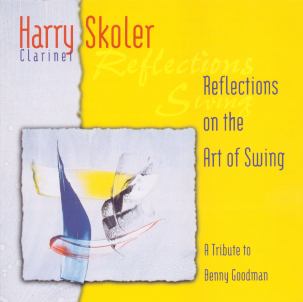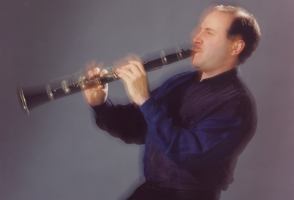



Harry Skoler's debut for Brownstone (Conversations in the Language of Jazz) featured his quartet playing swing standards along with some more modern pieces and the leader's original "Treasures." For his second recording, the clarinetist looks back towards his original inspiration, Benny Goodman.
Skoler's father had been a clarinetist but quit years before his son was born, and his mother was a singer who also played piano. "My mother started giving me piano lessons when I was five but I was not that interested so it didn't last very long" remembers Skoler who was born and raised in Syracuse, New York. "I took up clarinet when I was nine and had such miserable teachers that I quit within nine months. Then when I was thirteen my parents found a great teacher, Doug Soyars, and I started taking lessons from him. After a year and a half, he asked if I wanted to learn about jazz. I didn1t know anything about jazz at that point so he gave me a clarinet transcription of Benny Goodman from the 1940's and told me to go home and learn it. I did and the following week played it for him, horribly, as if it were a classical exercise. He took the clarinet out of my hand and wailed on the piece. The sound of the clarinet along with the swing rhythm completely blew me away and I went out and bought the album Benny Goodman's Greatest Hits. I made up my mind that this was going to be what I did with my life and I told my parents that night that I was going to be a jazz clarinetist."
 Skoler knew what direction he wanted to go in fairly early. "I started collecting records and my parents took me to concerts featuring such great musicians as Earl Hines, Bobby Hackett, Lionel Hampton, Teddy Wilson and Goodman. I was willing to play anywhere and had all kinds of gigs, getting all of the experience I could." He attended Ithaca College for a period and then went to Berklee College of Music (where two of his favorite teachers were Joe Viola and Andy McGhee), graduating in 1978. By then Skoler was also playing tenor, flute and piano and was quite familiar with more modern styles of jazz. A three year period in Nashville found him gigging with his own group, teaching and working in the studios. "I became concerned about making enough money so I went into architecture since my father is an architect. I studied at Syracuse University, but I just wasn't happy being away from playing. So I returned to music, attended the New England Conservatory and studied with Jimmy Giuffre. I found the confidence to fully dedicate myself to music; it has worked out well."
Skoler knew what direction he wanted to go in fairly early. "I started collecting records and my parents took me to concerts featuring such great musicians as Earl Hines, Bobby Hackett, Lionel Hampton, Teddy Wilson and Goodman. I was willing to play anywhere and had all kinds of gigs, getting all of the experience I could." He attended Ithaca College for a period and then went to Berklee College of Music (where two of his favorite teachers were Joe Viola and Andy McGhee), graduating in 1978. By then Skoler was also playing tenor, flute and piano and was quite familiar with more modern styles of jazz. A three year period in Nashville found him gigging with his own group, teaching and working in the studios. "I became concerned about making enough money so I went into architecture since my father is an architect. I studied at Syracuse University, but I just wasn't happy being away from playing. So I returned to music, attended the New England Conservatory and studied with Jimmy Giuffre. I found the confidence to fully dedicate myself to music; it has worked out well."
Since graduating from the New England Conservatory in 1986 with a Master of Music degree in Jazz Studies, Harry Skoler has been quite busy. He has worked in the studios, played with the shows "Ain't Misbehavin'" and "Nunsense" and led his own groups, most notably the quartet featured on both of his Brownstone recordings.
"Tim Gilmore has been playing drums with me since 1984. We worked together in a number of groups including a trio where I was playing mostly piano and synthesizer. Tim and I really connect and seem to be able to read each other's minds. I have been playing with bassist Roger Kimball since 1987 and I also originally played piano with him. In both cases our friendships have made our exchanges more conversational than with other players. I played a trio concert in 1993 with Tim and Roger (the first time that we all performed together) and at that point I wanted to get back to playing clarinet. I put on a couple of additional concerts with a pianist to round out the quartet but it wasn't clicking. Ed Saindon was the missing piece. Roger had played with Ed before and he recommended him. The first time we got together at Ed1s house, it worked. Ed plays vibes quite pianistically and has a unique style with sensitive phrasing and lots of color and texture. The quartet provides the perfect setting for my clarinet."
While Harry Skoler had played tenor, alto, flute and piano on one selection apiece (in addition to his clarinet) on Conversations in the Language of Jazz, for his Benny Goodman tribute he sticks exclusively to clarinet except for a taste of his cool-toned tenor on "Undecided."
"Ed Saindon did the arrangements, and the whole quartet had input during the rehearsals" remembers Skoler. "We played some of the first tunes that I had loved when I was a kid. I did not try to sound like Benny Goodman but I hear him in the songs. I feel that I can be myself playing swing and can make my own contribution without having to try to sound like a Benny Goodman clone." Although some of the arrangements closely recall the Benny Goodman Quartet and Sextet of the 1935-45 period, Skoler has his own lyrical sound on clarinet and does not copy Goodman's solos. Also, Ed Saindon's style owes as much to Red Norvo as to Lionel Hampton and the lack of a piano in the rhythm section helps give the Quartet its own personality.
Each of the 11 swing standards are easily enjoyable without detailed program notes. A few of the highlights include "Don't Be That Way" (which Goodman usually performed with his big band rather than small group), the uptempo "After You've Gone," Fats Waller's tricky "Handful Of Keys," a charming rendition of "What Can I Say After I Say I'm Sorry" and an unusual version of "Just You, Just Me" that is a clarinet-vibes duet. In addition there are two new and original compositions. "Benny" is a thoughtful duet by its co-composers Skoler and Saindon, while the vibraphonist contributed the complex but swinging "Reflections on the Art of Swing."
In addition to playing regularly with his Quartet, Harry Skoler performs at schools throughout New England with his "Adventures With Jazz" program. "We have a whole show that involves the kids and gets them to improvise for the first time. It is a mission I have to introduce this music to younger people." Through his own example and rewarding recordings such as Reflections on the Art of Swing, Harry Skoler is insuring that swing music will continue to thrive for decades to come.
Scott Yanow Editor of the All Music Guide To Jazz, and a regular contributor to nine music magazines.
Ed Saindon tours throughout the U.S. and Canada with performances at clubs, universities, and jazz festivals. Performances and/or recordings with Dave McKenna, Adam Macowicz, Warren VachŽ, Gray Sargent, Dick Johnson, Herb Pomeroy, Ed Thigpen, Louie Bellson, Phil Wilson, among others. Saindon is a national clinician for Selmer/Musser and Vic Firth, Inc. and has authored numerous vibraphone articles for percussion magazines worldwide. A leading proponent of the "four mallet school" of vibraphone playing and "pianistic approach", he has been the principal vibraphone instructor at Berklee College of Music since 1976.
In developing and adapting the pianistic approach within the context of small band swing, Saindon has taken his cue from pianists whose styles and hallmarks are rooted in the stride and swing tradition. Noted jazz critic Herb Wong has said of Saindon's unique approach, "His pianistic approach heralds a new, scintillating voice ... A fresh mallet leader."
Roger Kimball Performances throughout the U.S., Europe and the Middle East with numerous ensembles and orchestras, including Billy Eckstine and Warren VachŽ, among others. Kimball studied music at Boston University and the University of Miami. He has performed chamber music, and has numerous recording projects to his credit. He is a professional music copyist, and performs clinics and concerts for young people throughout New England with the ensemble Adventures With Jazz.
Tim Gilmore Performances with numerous ensembles and orchestras throughout the U.S., including Marian McPartland, Dick Johnson and Warren VachŽ, among others. Gilmore has recorded for numerous projects, including television and film scores. He has studied with legendary drummers Max Roach and Alan Dawson, attended Berklee College of Music, and holds a Bachelor of Science degree in Elementary Education and Music from Salem State College. He is a recipient of the Presidential Arts Scholarship. Gilmore educates young people in the language of jazz with clinics and concerts throughout New England with the ensemble Adventures With Jazz.
TOPSY Battle/Durham DON'T BE THAT WAY Parish/Goodman/Sampson/Webb UNDECIDED Robin/Shavers BENNY Skoler/Saindon AFTER YOU'VE GONE Creamer/Layton ROSE ROOM Hickman/Williams HANDFUL OF KEYS Waller A SMOOTH ONE Goodman JERSEY BOUNCE Wright/Plater/Bradshaw/Johnson WHAT CAN I SAY AFTER I SAY I'M SORRY? Donaldson/Lyman FLYING HOME Goodman/Hampton JUST YOU, JUST ME Green/Kleges REFLECTIONS ON THE ART OF SWING Saindon
These mp3 sound files were edited at MacIntyre Music to give you a feel for the musical range that each song encompasses. Sound helper applications are available to play back sound on your system, most of which are either free or shareware.